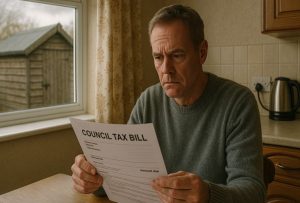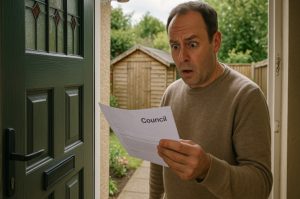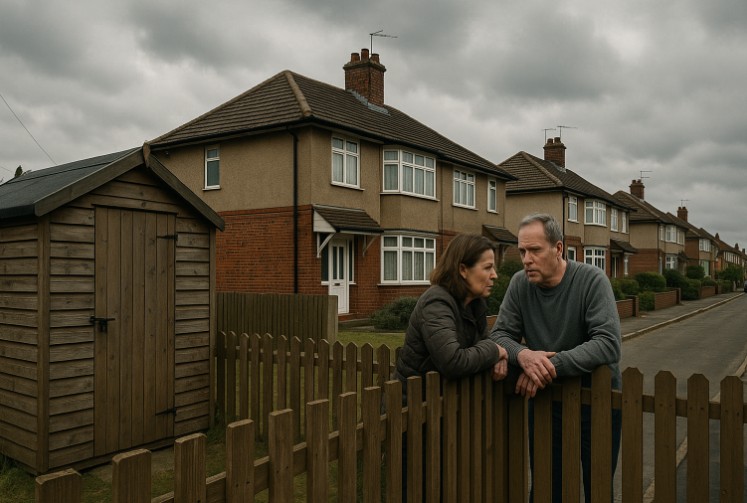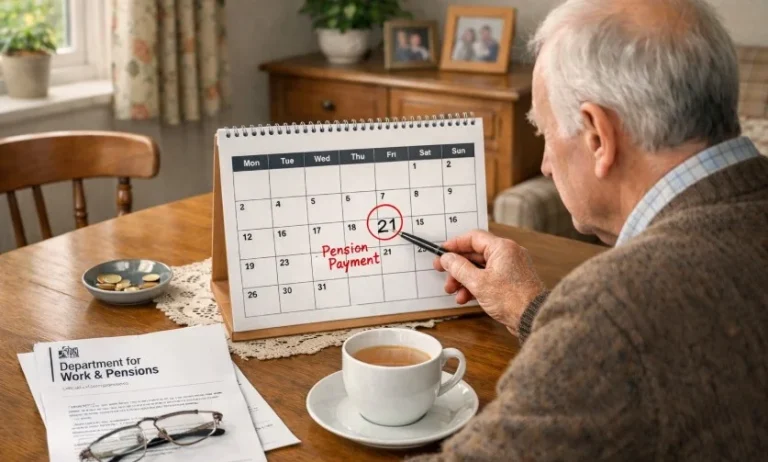Could your garden shed one day cost you more in council tax? The so-called Angela Rayner shed tax has sparked nationwide debate, with homeowners concerned about councils reclassifying outbuildings and spare rooms as taxable annexes.
From surprise charges for garden waste collection to unexpected property revaluations, many feel these measures amount to stealth taxation. As budget pressures mount on local authorities, experts warn that more households may face unexpected bills unless they understand the rules and their rights to challenge them
What Is the Angela Rayner Shed Tax and Why Are Homeowners Concerned?

The term Angela Rayner shed tax is not an official line in any government budget or statute, yet it has become a powerful shorthand for a set of controversial council practices and potential reforms.
It refers to the idea that garden sheds, outbuildings, or spare rooms could be reclassified as separate living units so-called “annexes” and taxed accordingly.
This concern has emerged from a mix of proposed policy changes, local council actions, and high-profile disputes. Angela Rayner, the Deputy Prime Minister, has backed a broader overhaul of the council tax system that could see wealthier areas paying more, particularly in London and the Home Counties.
While the stated aim is to make the system fairer, some homeowners fear it could embolden councils to seek extra revenue through reclassification of property features that have long been exempt.
Public awareness surged when actor James Buckley, known for his role in The Inbetweeners, took to social media to criticise his council for introducing a £60 charge for garden waste bin removal a service once included in his council tax bill. His statement, “taking more money off me and doing less,” was widely shared and resonated with thousands who have faced similar changes.
For many, this so-called shed tax is part of a broader pattern:
- Councils applying charges for services once covered by the main tax bill.
- Property revaluations based on minimal or incomplete evidence, such as old planning applications.
- Increased scrutiny of outbuildings, extensions, and converted spaces.
The concern is not merely about the financial cost. Homeowners also worry about the lack of clarity and consistency in how such reclassifications are applied.
In some cases, people have been hit with significant backdated bills for structures that have never been used as living spaces. For those on fixed incomes or already facing higher living costs, these demands can be both unexpected and financially damaging.
Critics argue that the phrase “shed tax” symbolises a creeping form of taxation where property owners pay more without receiving additional services in return. Supporters of stricter reclassification policies, however, maintain that all usable living spaces should contribute to local taxation, ensuring fairness for all residents.
How Are Councils Using New Tactics to Increase Council Tax Revenue?
Local councils across the UK are under unprecedented financial strain. Rising social care costs, increased wages for public sector staff, and the repayment of long-term debts have left many authorities searching for new ways to raise funds without directly increasing the standard council tax rate. This has led to the adoption of tactics that, while legal, are being criticised as unfair or overly aggressive.
Charging Separately for Previously Included Services
One of the most visible changes for many households has been the introduction of new fees for services that were once part of the council tax package. A clear example is the growing number of councils charging separately for garden waste collection.
- Homeowners in some areas now pay between £40 and £80 annually for green bin services.
- Critics argue that such changes amount to “double taxation,” with no corresponding reduction in the main council tax bill.
Reclassifying Outbuildings and Spare Rooms as Annexes
A particularly contentious tactic involves reclassifying certain structures as self-contained annexes. These can include:
- Garden sheds or summerhouses fitted with electricity or plumbing.
- Converted garages or lofts.
- Spare bedrooms with small kitchenettes.
If deemed a separate dwelling, such spaces can be issued their own council tax bill, even if they are only used by the homeowner’s family.
Pushing Properties into Higher Council Tax Bands
Councils can request a reassessment of a property’s band from the Valuation Office Agency (VOA) if they believe significant structural changes have increased its value since 1991. Common triggers for reassessment include:
- Large extensions or conservatories.
- Loft conversions with added bathrooms.
- Outbuilding conversions.
While the VOA must base valuations on 1991 property values, any substantial improvement can still result in a higher band and a bigger annual bill.
Using Planning Applications as Evidence for Reassessment
Planning applications, even those never acted upon, can alert councils to potential changes in property use. This has led to cases where:
- Councils initiate reassessments based solely on old applications for annex conversions.
- Homeowners face demands despite no physical changes having taken place.
This practice has drawn sharp criticism from legal experts, who say it encourages councils to pursue speculative revaluations.
Increased Monitoring and Street-Level Inspections
Some councils have stepped up physical inspections, with officials conducting “drive-by” checks or even looking over fences to spot possible changes. While such monitoring is legal, it has been labelled intrusive by residents, particularly when visits occur without prior notice.
These combined strategies have contributed to a significant rise in disputes between homeowners and local authorities. Lawyers specialising in council tax have reported a 20% increase in related enquiries over the past year, suggesting that public resistance is growing alongside the councils’ determination to secure additional income.
How Do Council ‘Snoopers’ Identify Properties for Revaluation?

The Valuation Office Agency (VOA) determines council tax bands based on property values as they were in 1991. While this system might appear fixed, councils can request a reassessment when significant structural changes have been made since that date.
Inspection and identification methods include:
- Examining planning applications for home improvements, which can trigger a review.
- Conducting in-person street inspections to look for extensions, loft conversions, or new structures.
- Using property sales as an opportunity to re-evaluate the banding.
Some residents have reported seeing officials inspecting gardens from the street or even looking over hedges to spot changes. This has caused concern about privacy and the fairness of the process.
Can a Garden Shed Really Be Classed as a Taxable Annex?
A shed or outbuilding can only be taxed as a separate property if it meets the definition of a self-contained dwelling. The key factors considered are:
- Presence of a sleeping area or bedroom.
- Functioning kitchen facilities.
- Bathroom with toilet.
- Independent access separate from the main house.
In some disputes, councils have attempted to levy charges based on outdated or incomplete planning records, even when no conversion work was ever completed.
Annex Classification Criteria
| Feature Required | Included in Council Definition? | Example Scenario |
| Bedroom | Yes | Loft conversion used as guest room. |
| Kitchen | Yes | Garden studio with a kitchenette. |
| Bathroom | Yes | Annex with en-suite facilities. |
| Separate Entrance | Yes | Outbuilding with its own external door. |
If one or more of these features is missing, the building should not legally be classified as a separate taxable dwelling.
What Are the Legal and Practical Ways to Challenge a Council Tax Rise?

When a council tax bill unexpectedly increases whether due to a higher property band or the classification of a structure like a shed as an annex homeowners have the legal right to challenge it.
The process, however, can be time-consuming and requires careful preparation. Understanding both the legal framework and the practical steps involved is essential to improving your chances of success.
Understanding Your Rights Under the Law
Council tax in England and Wales is administered by local authorities but banding decisions are made by the Valuation Office Agency (VOA). The VOA operates under legislation such as the Local Government Finance Act 1992, which outlines the criteria for determining whether a property or part of a property should be taxed separately.
Key points to note:
- You can challenge your band at any time if you believe it is incorrect.
- You have the right to appeal to the Valuation Tribunal if the VOA rejects your challenge.
- If successful, you can receive a refund for overpayments going back several years.
Preparing Strong Evidence
A successful challenge often hinges on the quality of evidence provided. This can include:
- Photographs showing the current condition and use of the property or outbuilding.
- Floor plans demonstrating that the space does not meet annex criteria (e.g., no kitchen or bathroom).
- Witness statements from contractors or previous owners confirming the lack of conversion work.
- Utility records proving the absence of separate services for the disputed space.
Deciding Between Legal Representation and Self-Representation
Homeowners can choose to either handle the challenge themselves or hire professional help. Each option has advantages:
- Legal Representation: Specialist solicitors in council tax disputes can navigate complex cases and have a higher success rate when evidence is strong. However, fees can reach £594 per day, with additional costs for surveys or expert reports.
- Self-Representation: Many homeowners succeed without paying legal fees, particularly when the facts are straightforward and well-documented. The trade-off is the need to invest significant time in understanding the process.
Using Free and Independent Support Services
Several independent organisations provide guidance at no cost:
- HomeOwners Alliance offers templates, checklists, and advice for making a council tax challenge.
- Citizens Advice provides free legal guidance and can help you understand your rights.
- Valuation Tribunal Service offers resources to prepare for hearings.
Escalating to the Valuation Tribunal
If the VOA refuses to adjust your band and you believe you have a strong case, the next step is to appeal to the Valuation Tribunal. This is an independent body that reviews disputes between taxpayers and the VOA.
- Appeals must be made within three months of the VOA’s final decision.
- Hearings are usually informal and can be conducted online.
- Tribunal decisions are binding and can result in the lowering of your band and the refund of overpaid tax.
Learning from Real-Life Case Outcomes
In one notable case, a homeowner in Kent successfully challenged a reclassification after providing photographs showing that the “annex” identified by the council was, in fact, a dilapidated shed.
The tribunal accepted the evidence and ordered the VOA to remove the separate tax charge. In another case, a family in Somerset overturned a band increase by proving that a room labelled as a rental flat was being used solely by their university-age son.
How Have Homeowners Been Affected by Shed and Annex Disputes?
Real-life disputes illustrate both the frustration and the potential financial stakes involved.
Simon Dyer, a Somerset homeowner, faced a bill of £3,676 for his main property, plus an additional £2,941 for a flat within it. The space in question was used solely by his family after the pandemic but was still treated as a separately taxable unit.
Alan Alexander from Kent received a £1,400 demand for what his council claimed was a converted annex. In reality, it was an old shed in poor condition. After six months of correspondence, including sending photographic proof, the VOA acknowledged the error.
Both cases highlight:
- The importance of acting quickly when receiving a reclassification notice.
- The persistence required to navigate the appeals process.
- The value of clear photographic and documentary evidence.
What Should You Do If You Receive a Shed Tax or Annex Demand?

Responding promptly to any unexpected council tax demand is critical to avoid penalties or enforcement action.
Recommended steps:
- Gather evidence such as photos, floor plans, and previous planning documents.
- Contact the VOA to initiate a formal review of the classification.
- Keep detailed records of all interactions with both the council and the VOA.
- If necessary, escalate the matter to the Valuation Tribunal within three months of the VOA’s decision.
A proactive approach not only increases your chances of success but can also result in refunds for overpayments going back several years.
Conclusion
The growing controversy over the Angela Rayner shed tax reflects wider tensions between local authority funding needs and homeowners’ rights. While councils argue they are following existing valuation laws, critics see an aggressive push to maximise revenue through reclassification.
Knowing the legal definitions, keeping accurate property records, and acting quickly on any disputed demand are essential steps to protect against overcharging. In a climate of rising living costs, vigilance and awareness remain the strongest safeguards for UK households.
FAQs
How does the Angela Rayner shed tax relate to council tax reform?
The term is a public shorthand for concerns that proposed changes to council tax and aggressive reclassification tactics will increase charges for homeowners.
Can any garden structure be taxed separately?
Only if it meets the criteria for a self-contained dwelling with its own facilities and entrance.
Who decides my council tax band?
The Valuation Office Agency is responsible, although councils can request reassessments.
How long does it take to challenge a banding decision?
It can take months or even years, depending on the complexity of the case.
Is it worth hiring a solicitor for a shed tax dispute?
Legal help can improve your chances but comes at a significant cost; many succeed without representation.
What happens if I ignore a shed tax demand?
The council can add penalties, and in extreme cases, use bailiffs to recover the amount.
Where can I find free help to challenge a council tax decision?
Organisations like the HomeOwners Alliance and Citizens Advice provide free support.
Related Articles:








